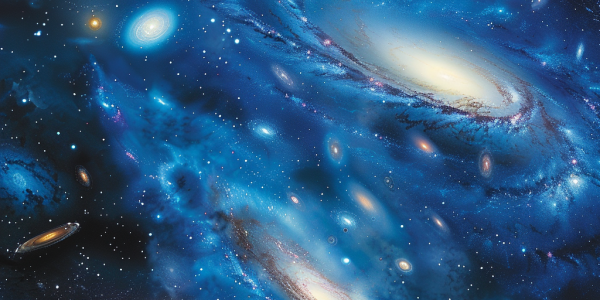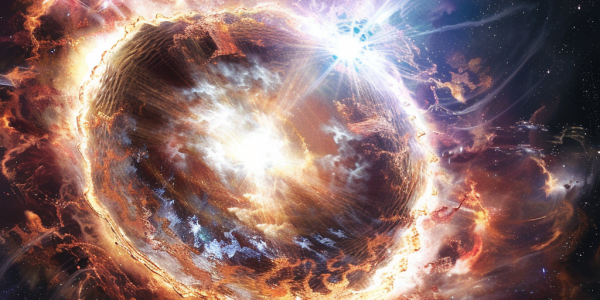Discovery of Unusually Aligned Dwarf Galaxies Challenges Dark Matter Theories
A groundbreaking discovery reveals a group of dwarf galaxies aligned in a near-straight line, challenging existing theories of dark matter and galaxy formation. Researchers, led by Sanjaya Paudel from Yonsei University, found these galaxies 117 million light-years from Earth, exhibiting coherent rotational dynamics that contradict the cold dark matter model. This study opens new avenues in astrophysics, suggesting the need for reevaluation of dark matter’s role in the universe.
New Insights into FU Orionis: A Young Star’s Extreme Conditions and Planet Formation Challenges
A groundbreaking study using Hubble Space Telescope data reveals that FU Orionis, a young star 1,360 light-years away, exhibits extreme temperatures of approximately 16,000 Kelvin. This discovery raises critical questions about rocky planet formation in such harsh conditions. Researchers highlight the star’s rapidly spinning accretion disk, which creates intense heat and instability, complicating the development of Earth-like planets. These findings not only enhance our understanding of stellar evolution but also illuminate the intricate processes governing planet formation in the universe.
December 2024: A Month of Celestial Wonders and Stargazing Events
December 2024 promises spectacular celestial events, including Jupiter at opposition on December 7 and the Geminid meteor shower peaking on December 13. Stargazers can also enjoy the winter solstice and Ursids meteor shower on December 21. Discover the best stargazing destinations in India and tips for an unforgettable experience under the night sky.
James Webb Space Telescope: Ongoing Efforts to Maintain Optical Precision for Cosmic Discoveries
The James Webb Space Telescope (JWST) is redefining cosmic exploration with its advanced optical capabilities and meticulous mirror alignment. Since its launch, a dedicated team has ensured its mirrors remain perfectly aligned, enabling groundbreaking astronomical discoveries. Learn about the ongoing maintenance efforts and the pivotal role of the NIRCam instrument in monitoring JWST’s performance.
Astrophysicists Measure Temperatures in Neutron Star Collision, Unveiling Heavy Element Origins
Astrophysicists at the Niels Bohr Institute have made a groundbreaking discovery by measuring the temperature of elementary particles from neutron star collisions, leading to the formation of the smallest black hole ever recorded. This research, published in Astronomy & Astrophysics, reveals critical insights into the creation of heavy elements like gold and platinum, highlighting the significance of neutron star mergers in the cosmic landscape. The study emphasizes the importance of global collaboration among observatories in unraveling the mysteries of the universe’s most violent events.
Moon’s Close Encounter with Saturn to Dazzle Stargazers Tonight
Tonight, November 10, 2024, stargazers can witness a stunning celestial event as the Moon approaches Saturn, coming within five arc minutes. This rare opportunity includes a lunar occultation for viewers in central Florida and parts of Central America, where the Moon will obscure Saturn for about an hour. Don’t miss this chance to observe the beauty of our solar system with the naked eye or through binoculars!
Astronomers Renew Search for Elusive ‘Planet 9’ in Kuiper Belt
Astronomers are on a decade-long quest to find the elusive ‘Planet 9’ in the Kuiper Belt, a region beyond Neptune. Despite never being observed, indirect evidence suggests its existence, with peculiar orbits of trans-Neptunian objects hinting at a massive, unseen body. Discovering Planet 9 could reshape our understanding of the solar system and the dynamics of planetary formation, making it a significant focus for future astronomical studies.
Navigating Digital Privacy: Understanding Cookies and Data Management
In today’s digital age, understanding privacy choices is crucial as websites utilize essential and optional cookies for functionality and personalization. A recent study using the James Webb Space Telescope reveals new insights into early black hole formation, emphasizing the intersection of data privacy and scientific discovery.
Navigating Privacy Choices and Cosmic Discoveries: Insights from V404 Cygni
Explore the dual themes of personal privacy in the digital age and the fascinating discoveries surrounding the black hole V404 Cygni. Learn how cookies impact your online experience and the latest insights into cosmic phenomena, including the dynamics of low-mass X-ray binaries and the significance of natal kicks in black hole formation.
Breakthrough Discovery of Complex Carbon Molecules in Interstellar Cloud Sheds Light on Origins of Life
A groundbreaking discovery by MIT scientists reveals complex carbon molecules, specifically pyrene, in a distant interstellar cloud. This finding enhances our understanding of the origins of life and suggests that these organic compounds could have contributed to prebiotic chemistry on Earth. The detection of pyrene challenges previous notions about the survival of complex molecules in harsh cosmic environments, opening new avenues for research into the building blocks of life in the universe.










